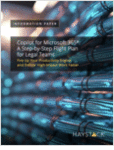In the federal arena, at least in New Jersey, there is no mistaking when it comes to who is liable under Title VII of the Civil Rights Act, 42 U.S.C. § 2000e et seq. Regardless of how you slice it, individual liability does not exist. See Sheridan v. E.I. du Pont de Nemours & Co., 100 F. 3d 1061 (3d Cir. 1996). Likewise, under the New Jersey Law Against Discrimination, N.J.S.A. 10:5-2 (LAD), individual liability does not exist. See Tarr v. Ciasulli, 181 N.J. 70, 83 (N.J. 2004) (under a plain reading of the statute, individual supervisors are not defined as an employer).
However, unlike Title VII, an individual supervisor can be held liable under the LAD if such individual aids, abets, incites, compels or coerces the doing of any of the acts forbidden under the LAD. Recently, the courts have taken this concept one step further and, in essence, eviscerated the “plain reading of the statute” regarding individual liability. Now, by way of what courts themselves refer to as an awkward theory of liability, individuals can aid and abet their own conduct and, under a separately pleaded allegation, become indirectly, individually liable. Somehow, as hereinafter explained, the courts’ reasoning adds up.




